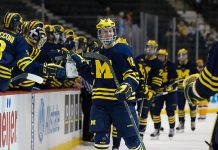It’s been an interesting year in the CCHA.
Obviously, the conference has an impressive crown jewel in Miami, the nation’s top ranked team and a likely top seed in this year’s NCAA Tournament. That said, however, according to the latest PairWise Rankings, only three teams from the conference would make the tournament were the season to end today, and Michigan, for the first time in 20 years, wouldn’t be one of them.
More relevant to our discussion, however, is the dearth of top-ranked scorers. Of the top 20 players in the nation in points per game, none of them plays in the CCHA. Corey Tropp is tops, ranking 22nd, but we’ll get to him. But with what we’ve been up to lately, that may not be much of an issue. After all, to borrow from Ken Campbell – and really, I’m borrowing his whole “Campbellnomics” system – we’re not asking how many, we’re asking how many mattered.
To recap, we’re awarding a point per goal and half a point per assist for every one of these six categories a player’s point falls into: first goal, go-ahead goal, tying goal, last lead, comeback goal, overtime goal.
We’ll start with Corey Tropp, the top scorer in the conference with 1.22 points per game on 20 goals and 19 assists in 32 contests. Applying the Campbellnomics system, we find that Tropp has had as big a hand as you would expect in the Spartans’ success this season, he checks in with 33 Campbellnomics points, for an average of 1.03 CPPG.
Next on the list is Northern Michigan’s Mark Olver, who’s had a strong season for the Wildcats, with 33 points (15g, 18a) in 29 games for an average of 1.14 PPG, good for 32nd in the country. Unfortunately for Olver – and even more unfortunately for other top CCHA players we’ll be looking at tonight – the big points in this system usually involve winning games, and the Wildcats haven’t done as much of that as they would like this season. All told, Olver checks in with 18.5 Campbellnomics points and .64 CPPG, a respectable total on a team that’s not winning big.
Speaking of teams not winning big, Ohio State has had a rough landing after last season’s trip to the NCAA tournament, which means that a number of Zac Dalpe‘s 31 points (15g, 16a) have gone to waste. Dalpe has been able to amass just 13 Campbellnomics points in 28 games this season, averaging out to just .46 CPPG, the lowest average of any player we’ve looked at. But that’s what happens when a team isn’t winning.
And if there’s any consolation for the disappointing season in Columbus, it’s that “That School Up North,” better known to the rest of us as Michigan, is also suffering through a down year. That’s left the Wolverines’ top scorer, Carl Hagelin, a similar problem to Dalpe. Hagelin has 33 points in 31 games this season on 13 goals and 20 assists, but that 1.06 PPG average only proves good for 16.5 Campbellnomics points, or an average of an even 0.5 CPPG.
But what, then, of the team that is winning, and winning big, those top-ranked Miami RedHawks? The scoring has been very balanced for Rico Blasi’s team – as the fine folks at INCH noted this week, four RedHawks have 24 points or more this season, so there hasn’t been the same kind of opportunity for one player to shine above all the others. That said, Miami does have a pair of players leading the team in points per game in forwards Tommy Wingels and Carter Camper. I initially planned to zero in solely on Wingels (Especailly after he stepped up bigtime at the Frozen Four last season), but I figured that as long as I was going through all of Miami’s games, I may as well take a look at Camper as well (particuarly since I know that a lot of TV folks like saying his name…). It paid off, as Camper (12g, 19a) . Wingels, with 14 goals and 17 assists this season, has a total of 25.5 Campbellnomics points, and an average of .85 CPPG. Camper, meanwhile, showed he’s hardly an afterthought with 19 Campbellnomics points and an average of 0.63 CPPG.
So, just to recap:
Corey Tropp, Michigan State: 33 (1.03)
Tommy Wingels, Miami: 25.5 (.85)
Mark Olver, Northern Michigan: 18.5 (.64)
Carter Camper. Miami: 19 (.63)
Carl Hagelin, Michigan: 16.5 (.5)
Zac Dalpe, Ohio State: 13 (.46)
Now, Tropp, as others have pointed out, is problematic because of his suspsension last season. That said, he’s proven that he’s more than just the top scorer in the CCHA, because he’s there when it counts, more often than not. Also, Tommy Wingels hasn’t been part of the Hobey conversation this season until recently, but even with three other skaters with 24 points on his team, and a lower point total than others, his Campbellnomics average also shows a player who knows how to step up when it counts.
What do you think? Is Wingels a likely Hobey Finalist (or better) this season?


